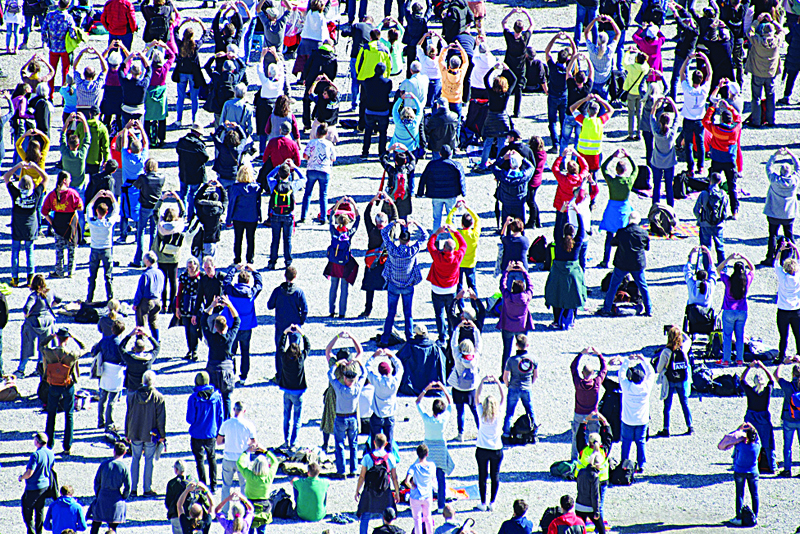
BERLIN: Thousands of demonstrators in southern Germany protested against coronavirus restrictions over the weekend, police said yesterday, although organizers failed to mobilize enough people for a planned human chain around Lake Constance. Thousands of counter-demonstrators in Constance also turned out to show support for the government's measures to contain the coronavirus while also protesting against right-wing supporters in the other group, police said. Overall, police counted between 10,500 and 11,000 people taking part in the different demonstrations on Saturday and the two-day protests continued on Sunday with sunny weather likely to draw in further participants, a police spokesman said.
"So far, the situation is calm," the police spokesman added. Organizers of the protests against coronavirus curbs had initially hoped to mobilize more than 200,000 people. Local authorities had imposed restrictions such as respecting social distancing to avoid further infections. They also banned the use of Germany's imperial Reichsflagge, a symbol used by neo-Nazis and other far-right groups as an alternative to the forbidden swastika flag.
The marches have attracted a mixed crowd of civil rights activists and people who oppose vaccinations, as well as neo-Nazis and members of far-right groups including the opposition party Alternative for Germany (AfD). During mass marches against coronavirus curbs in Berlin in late August, protesters stormed the steps of the Reichstag parliament building, some of them holding far-right Reichsflagge. The images went around the world and were condemned by leading German politicians.
Germany so far has managed the COVID-19 pandemic relatively well by keeping infections and deaths low compared to other European countries during the first wave in spring. But infection numbers are rising again and authorities are mulling further restrictions which could limit public life and slow down the economic recovery after Germany suffered its worst recession on record in the first half of the year. Meanwhile, India hopes to receive up to 500 million doses of coronavirus vaccine by July to inoculate about 250 million people, health minister Harsh Vardhan said yesterday, as infections in the world's second-worst affected country continue to surge.
India's has recorded some 6.55 million infections, with 75,829 in the past 24 hours, while COVID-19-related deaths have totaled 101,782, health ministry data showed. "There is a high-level expert body going into all aspects of vaccines," Vardhan wrote on Twitter. "Our rough estimate and the target would be to receive and utilize 400 to 500 million doses covering (200 million-250 million) people by July 2021." Serum Institute of India and private companies have been teaming up with organizations from the Bill & Melinda Gates Foundation to US drug developer Novavax Inc in a scramble to secure vaccines for the country of 1.3 billion people.
India has set up committees to look into various aspects of the vaccine supply chain, including availability timelines for various vaccines, while obtaining commitments from manufacturers to ensure the maximum doses are available, Vardhan said. He said the federal government is committed to taking all measures to ensure "fair and equitable" distribution of vaccines once they are ready.
The South Asian nation, second only to the United States in caseload, has scope for higher infections as a large chunk of the population remains unexposed to the virus, a survey showed on Tuesday. To prioritize the distribution of coronavirus vaccines, the health ministry aims to prepare a list of key personnel, such as frontline health workers, by the end of the month. - Reuters









